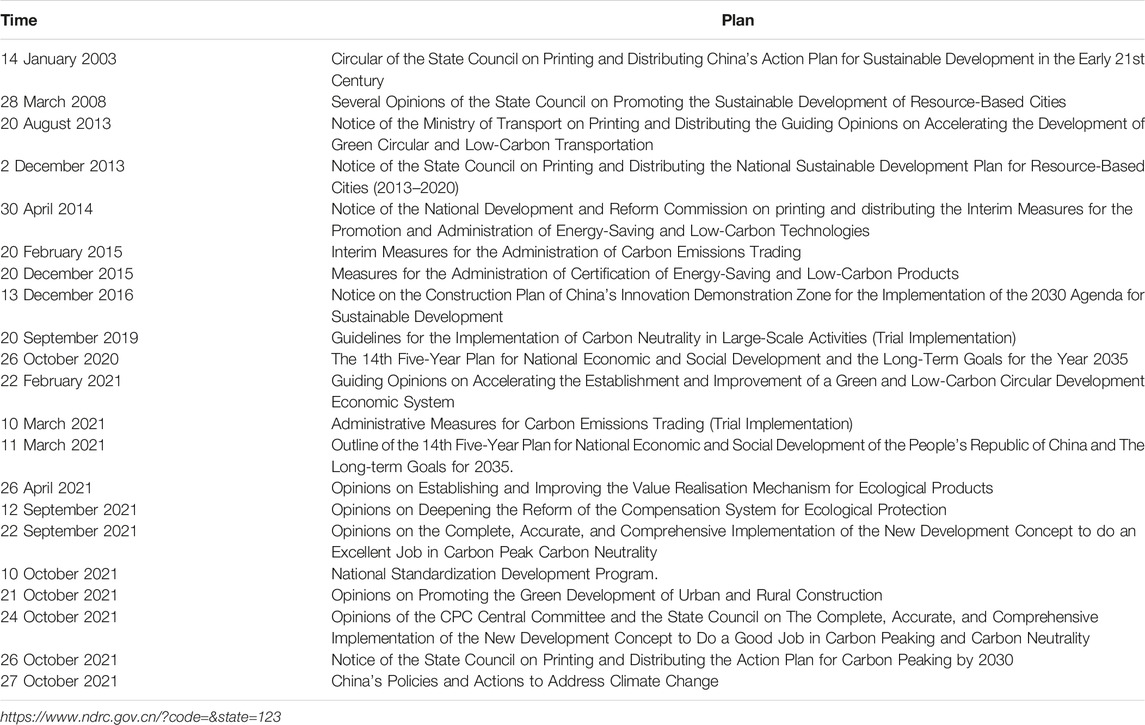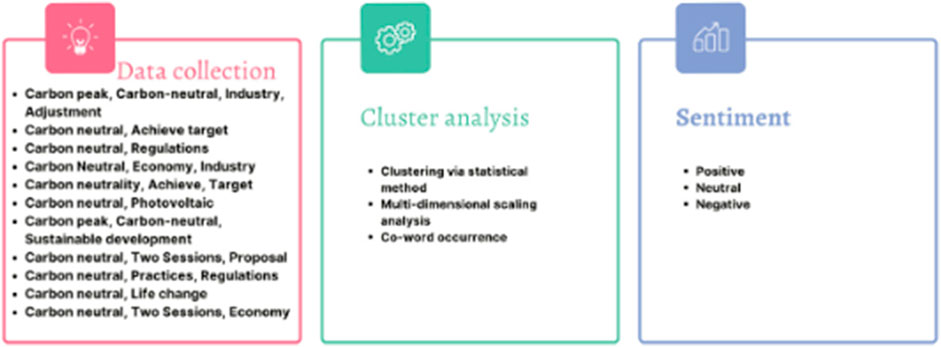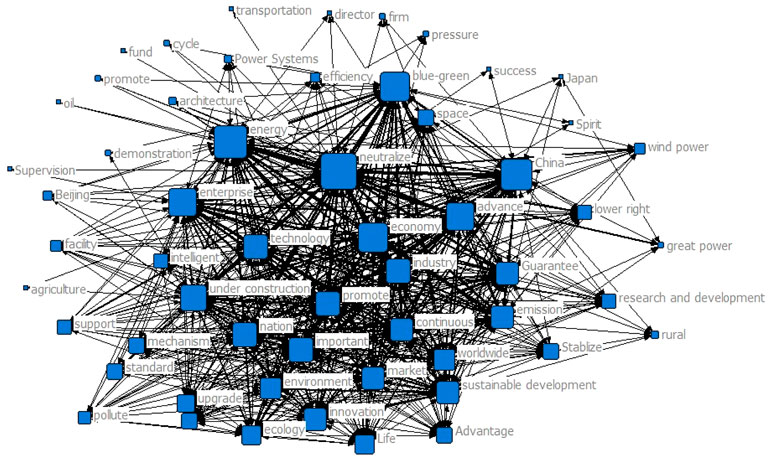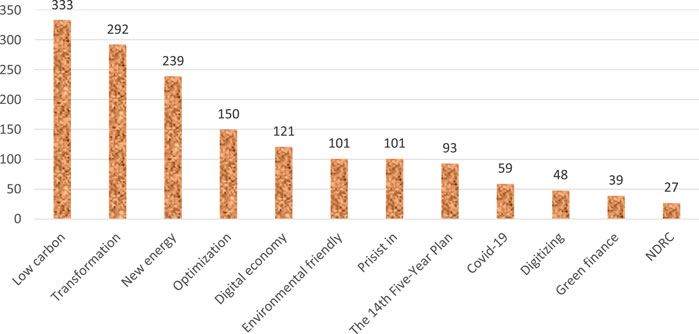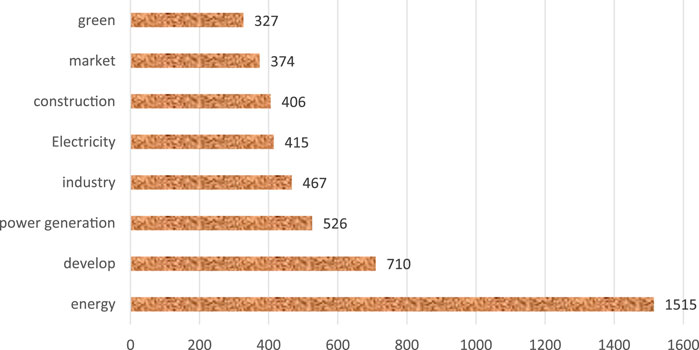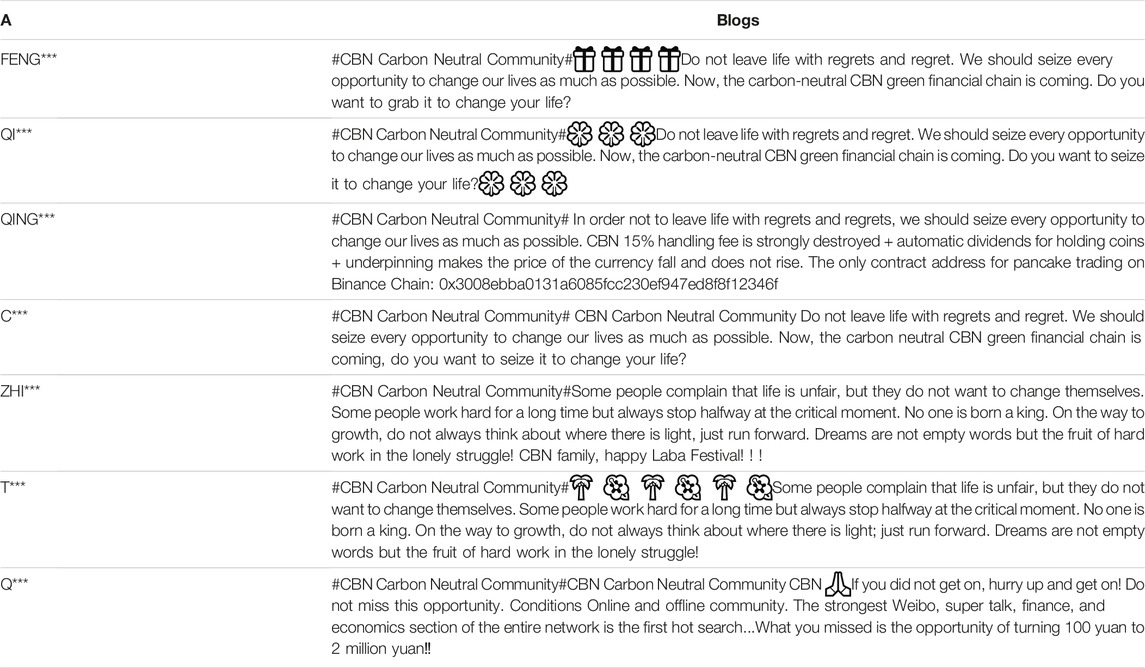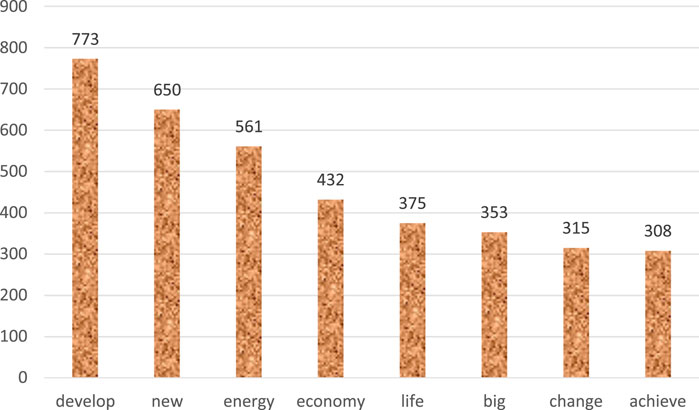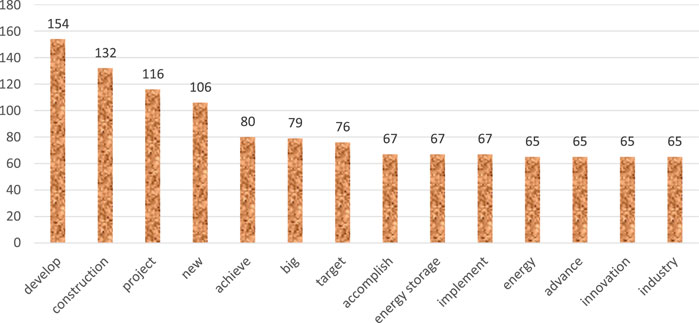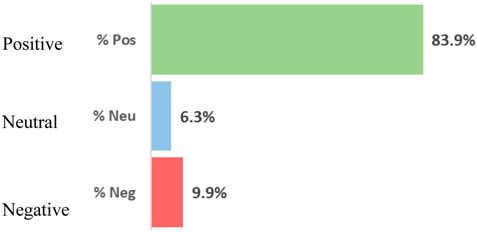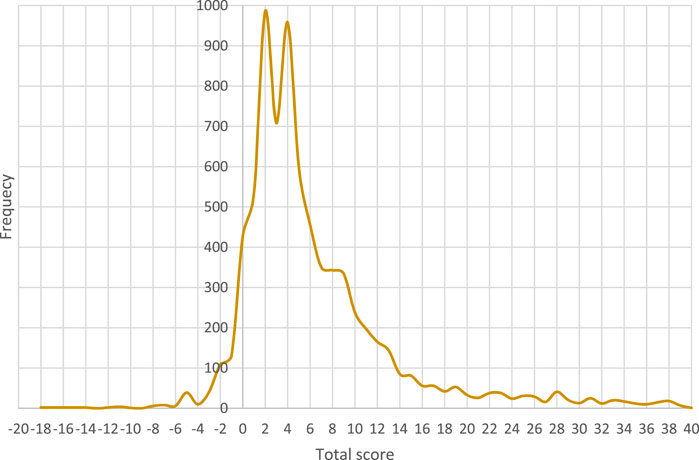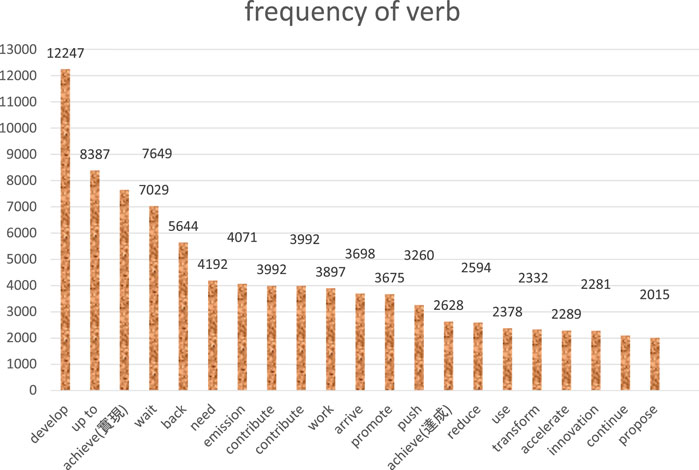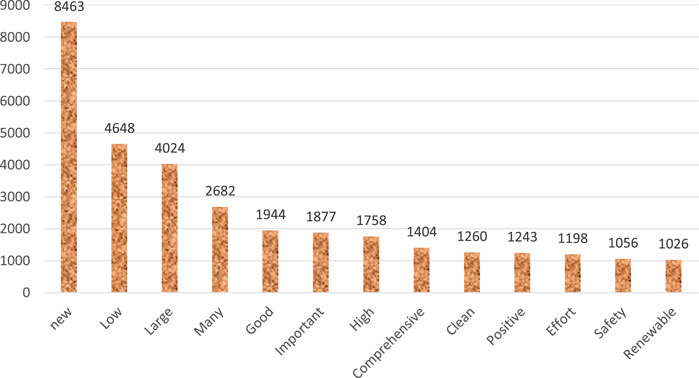A Study on Public Perceptions of Carbon Neutrality in China: has the Idea of ESG Been Encompassed?
- 1Sustainable Real Estate Research Center and Department of Economics and Finance, Hong Kong Shue Yan University, North Point, China
- 2Department of Decision Analytics and Risk, Southampton Business School, Southampton, United Kingdom
- 3Civil and Architectural Engineering Institute, Panzhihua University, Panzhihua, China
- 4Anhui University of Finance and Economics, Bengbu, China
China has pledged to become carbon neutral by 2060 and has employed a variety of strategies to minimize carbon emissions. As people’s support to achieve the carbon neutrality goal affects its success, this study reviewed the public’s perception of carbon neutrality via cluster analysis on microposts. The co-occurrence matrix showed 258 nodes and 3,212 ties in the carbon neutrality social network. The top five most prominent nodes were neutralized, energy, China, blue-green, and economy. The keyword like blue-green (means water and plant) illustrated the popular terminology used by mainland Weibo users and its essential role in carbon neutrality. The multidimensional scaling analysis found that there were 11 clusters in carbon neutrality. The results revealed that people’s concerns about carbon neutrality were mainly related to the environment (e.g. low carbon, sustainable, and wind power), social (e.g. country and poverty), and governance (responsibility, government report). Weibo users believed that achieving carbon-neutrality allows us to pursue a better life. Among the data collected, positive sentiment microposts (83.9%) were approximately eight times more than the negative ones (9.9%), and only 6.3% were neutral. The results indicated that most Weibo users were opitimistic on carbon neutrality.
1 Introduction
One of the most serious environmental problems and difficulties people confront in the 21st century is global climate change (Wei et al., Forthcoming 2022). Thus, the idea of environmental, social, and governance (ESG) is suggested. Listed companies have to submit ESG reports as required by some stock markets. Similarly, carbon neutrality has become an essential agenda in global climate governance. As of 22 April 2022, 83 countries worldwide have set their goals to reduce global carbon emissions by 74% (Climate Watch 2022).
Parties are urged by the Paris Agreement to submit their most recent nationally determined contributions and long-term low-temperature greenhouse gas emission development policies by 2100. The proposal was made during the Paris Climate Peace Conference in 2020 to attain carbon neutrality targets between 2050 and 2060. China, a growing nation, has pledged to the international community that it will become carbon neutral by 2060. (Zhao, 2022). In September 2020, the Chinese government set a goal to achieve carbon neutrality by 2060 (Huang et al., 2022).
The idea of sustainable development, green mountains, and clear water existed long ago on China’s agenda. Similar to this is the notion of “carbon neutrality”. China explores the means to reduce carbon emissions under the premise of industrial transformation and maintain rapid economic development simultaneously. However, cooperation between businesses and individuals to realise national policies is crucial for reaching carbon neutrality. As a result, its success depends on how much a nation’s citizens care about, are aware of, and support achieving carbon neutrality (Shi 2006).
This article reviews people’s concerns on Weibo because of the abovementioned lines of thoughts. Weibo is one of the most well-known social media platforms in mainland China (Zeng and Li, 2022) that enables people to publish their opinions online. Analyzing the published posts reflects people’s sentiments and perceptions on social issues. It can overcome traditional questionnaire problems, such as inadequate response (Li et al., 2022). Moreover, collecting people’s perception allows us to obtain the real-time data (Lee et al., 2022, forthcoming). All these drive us to use a relatively new approach to collect data from Weibo, rather than collecting data via survey.
In the following sections, Section 2 examines China’s strategic approach to reducing carbon emissions. The literature review in Section 3 introduces Weibo and the databases we explored for information on carbon neutrality in China. It also exemplifies earlier studies on emotion analysis and carbon neutrality. Section 4 provides examples of the research approach and findings. Section 5 wraps up the article.
2 China’s Strategic Plan for Carbon Neutrality
China has set a target of reaching a peak in carbon dioxide emissions by 2030 and working toward carbon neutrality by 2060. China’s achievements have suggested that economic growth does not necessarily have to slow down to attain the goal (State Council of the PRC, 2021a). Since the Communist Party’s 18th National Congress, China has completed 960 million mu (about 64 million hectares) afforestation. The forest cover increases by 2.68%–23.04%.
China’s strategic plan at the national level regarding carbon reduction can be summarized as commitments, systematic planning, and implementation. Table 1 shows China’s important national documents on carbon reduction since 2003.
The State Council of the PRC’s circular on Printing and Distributing China’s Action Plan for Sustainable Development in the early 21st century (State Council of the PRC, 2003) highlighted the philosophy behind China’s sustainable development strategy focuses on people-oriented, harmony between human and nature as the primary concern, economic development as the core target, improving people’s quality of lives as the starting point. Scientific, technological, and institutional innovation, constantly promotes the coordination between resources, and improves China’s national strength and competitiveness, and lays a solid foundation to realizing the third-stage strategic goal.
Notice of the State Council on Printing and Distributing China’s Implementation of the 2030 Agenda for Sustainable Development Innovation Demonstration Zone Construction Plan (State Council of the PRC 2016) centered on the implementation of the 2030 Agenda for Sustainable Development and aimed at reaching future development goals in poverty reduction, health, education, and environmental protection. While innovation is the driving force, China will promote economic and social development. The target year of the agenda for reaching the goal of sustainable development is the same as reaching a carbon peak in 2030.
In 2021, the State Council initially released their opinions on carbon neutrality and carbon peak (State Council of the PRC, 2021b). The proposal highlights the attainment of carbon peak and carbon neutrality as a the direction. Building a community with a common destiny for all of humanity is a solemn obligation.
The Action Plan for Carbon Peak before 2030 (State Council of the PRC, 2021c), published by the State Council on October 26, 2021, outlined China’s development strategy and ideology for reaching a carbon peak.
3 Literature Review
3.1 Carbon Peak and Neutrality
According to the Intergovernmental Panel on Climate Change (IPCC, 2022), “carbon neutrality” refers to the anthropogenic emissions of carbon dioxide that are balanced by anthropogenic removals over a particular period. A “carbon peak” has been proposed in line with the carbon neutrality concept. It is defined as where carbon dioxide emissions reach the peak, stop increasing, and then fall. Prior to achieving carbon neutrality, the carbon peak must be reached.
Using industrial data from China, Zhang et al. (2021) evaluated how the carbon trading industry will affect economic production and carbon emissions. China may be able to meet the 2060 carbon neutrality goal, according to research by Yang et al. (2021). Due to the widespread use of coal-fired power, Wyrwa et al. (2022) investigated how to achieve carbon neutrality and suggested solutions. From the construction industry standpoint, Sun et al. (2022) carried out the research and review on achieving carbon neutrality in the construction industry. Some studies have investigated the relationship between renewable energy and carbon emission reductions (Gullberg et al., 2014).
3.2 Weibo
In China, the general public's favorite social media is Weibo. It allows users to share information in words, images, and videos (Zeng and Li, 2022). In the 2017 Research Report on the Development of Internet Governance in China (Zhang and Lu, 2018), websites and social media were the main news sources, followed by WeChat and Weibo. WeChat (27%) and Weibo (38%) were the top three media information dissemination channels. Despite WeChat is also a social media platform, it serves a fundamentally different purpose than Weibo. Weibo is frequently referred to be Chinese Twitter, although WeChat is comparable to “WhatsApp.” Weibo had 249 million average daily active users and 573 million monthly active users by the end of 2021, according to the company’s 2021 fourth quarter and full-year financial report (Weibo 2022). In 2020, people who learned about COVID-19 through Weibo made up 57.74% throughout the pandemic preventive and control phases (Zhu and Pan, 2021).
Weibo users can look for microposts that contain specific themes by keyword search on Weibo users can create tags that resemble Twitter’s tags. However, the syntax is #tag#. A tag is typically used for a more specific event, making it easy for others to search for and discuss. Instead of focusing on tags, this study examines the entire contents of Weibo micro posts. This is because the search results encompass all those with tags. A micropost would not appear in search results if it was published without a “#tag#.”
For instance, Tommy wrote on a micropost that carbon neutral is incredible! “#Carbon neutral is impossible#” said Janet in a blog post. As there is no “#tag# in Tommy’s micropost, nobody could see his by searching for the tag. Yet, Janet”s posts could be seen.
3.3 Sentiment Analysis
Sentiment is an essential part of human beings. People express their sentiments and opinions about a topic through their posts on social media. Sentiment analysis uses computer algorithms and a word dictionary to automatically extract users’ emotional states. Public opinion analysis, information prediction, information screening, personalized recommendations, and many other industries have benefited greatly from this kind of analysis (Poria et al., 2017). Song et al. (2022) studied linguacultural differences by analyzing Twitter sentiment via machine learning. It found that more positive English tweets were more likely to be retweeted. Nevertheless, more negative French tweets were more likely the tweets to be retweeted. Yao et al. (2021) found that there was a positive correlation between retweets and favorites in construction safety knowledge sharing.
On the Internet, bad news has constantly been circulated. In the Chinese proverb “seven emotions and six desires,” four express negative emotions. Weibo’s share of the first adverse event reports is as high as 75.6%, according to studies by Yin et al. (2011) and Tang et al. (2021). People are inherently more sensitive to unpleasant feelings.
4 Research Method and Results
This study obtained the real-time Weibo data, it involved three main processes: data crawling, clustering and sentiment analyses (Figure 1). It investigated 11 sets of keywords in Chinese: 1. carbon peak, carbon-neutral, industry, and adjustments; 2. Carbon neutral and achieve target; 3. Carbon neutral and regulations; 4. Carbon-neutral, economy, and industry; 5. Carbon neutrality, achieve, and target; 6. Carbon-neutral and photovoltaic; 7. Carbon peak, carbon-neutral, and sustainable development; 8. Carbon-neutral, two sessions and proposal; 9. Carbon-neutral, practice, and regulations; 10. Carbon-neutral and life change; and 11. Carbon-neutral, two sessions (Table 2).
4.1 Keyword Search Results
There are 7,038 relevant microposts from Weibo. After deleting the same microposts from the same users and irrelevant content, there are 3,851 carbon neutrality microposts. The co-occurrence matrix is analyzed from UCINET 6. Degree Centrality is the most direct measure of node centrality in network analysis. The larger the node the higher is the degree of centrality, and the more influential the node is in the network. From Figure 2, 58 nodes and 3,212 ties are observed. The top five most prominent nodes are neutralized, energy, China, blue-green (in mainland China, blue green refers to the water and plant), and economy, which are vital keywords in carbon neutrality. Keyword like blue-green reflects Chinese slang used by Weibo users.
The cluster analysis method uses the statistical method of clustering, takes the frequency of co-word occurrence as the research object, simplifies the co-occurrence network into the relationship between several groups, and visually illustrates the results by clustering. Multidimensional scaling analysis finds the topic structure by measuring the distance between topic words and can intuitively judge the position of a research field within the discipline. The KHCoder is used to perform the clustering of research samples from Weibo. In Figure 3, there are 11 clusters. The most crucial cluster includes carbon, neutrality, goal, industry, development, new, green, adjustment, structure, consumption, low-carbon, transformation, sustainable, economic, and social. The second-largest cluster includes country, emission, reduction, major, and responsibility. The third-largest cluster includes capacity, power, and generation. It also reveals various people’s concerns on carbon neutrality link to the environment (e.g. low carbon, sustainable, and wind power), social (e.g. country and poverty), and governance (responsibility and government report).
4.2 Keyword Search Results
4.2.1 Carbon Neutral, Economy, and Industry
High-frequency words included the following among the 951 microposts found using the keyword search “carbon neutral, economy, and industry”, high-frequency words included the following: Development and Reform Commission, slip, COVID-19, unfavorable, new energy, digitizing, optimization, low carbon, transformation, the 14th Five-Year Plan, green finance, strive, environmentally friendly, digital economy, and persist in Figure 4.
Low-carbon (333), new energy (239), and transformation (292), appeared to be the most often stated keywords (one to five words) connected with “carbon neutral, economy, industry” in the findings of tokenisation. It is consistent with the national goal of industrial transformation to drive low-carbon economic development and new energy development.
Positive high-frequency keywords are associated with new policies (National Development and Reform Commission, Transformation, and 14th Five-Year Plan), digitization (digital economy and green finance), and new energy (low carbon and environmentally friendly). The words “persist in” and “strive” convey the nation’s and its citizens’ confidence in driving economic growth through industrial transformation.
4.2.2 Carbon Peak, Carbon-Neutral, Industry, and Adjustment
There were numerous duplicates among the 1,416 microposts for the keywords “Carbon peak, Carbon-neutral, Industry, and Adjustment.” Forty media sites, for instance, published the same micropost regarding the “China Carbon Peak Carbon Neutrality Progress Report in 2021” 623 unique microposts left after removing duplicates. The following words frequently appeared in the high-frequency keywords list: energy, develop, carbon peak, carbon-neutral, new, green, accomplish, enterprise, China, promote, industry, advance, work, industrial structure, and target (Figure 5).
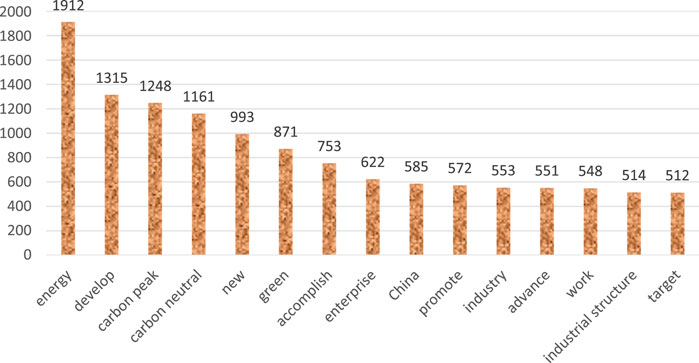
FIGURE 5. Most mentioned keywords for “Carbon peak, Carbon-neutral, Industry, and Adjustment” in Weibo microposts.
The keywords “carbon peak, carbon-neutral, industry, and adjustment“ were mentioned in 177 microposts, which made up 28.41% of all posts. This demonstrates that Weibo users consider industrial change is important to reach carbon neutrality. Among them, 52 microposts has unique authors who commented on “Guiding Opinions on Promoting the High-quality Development of Central Enterprises and Doing a Good Job of Carbon Peak carbon neutrality.” These comments centre on the government’s declarations: “by 2025, the adjustment and optimisation of the industrial and energy structures of central enterprises will make significant progress; the energy utilisation efficiency of key industries will be greatly improved; the construction of new power systems will be accelerated; the research, development, and promotion and application of green and low-carbon technologies will make positive progress; total energy consumption of the output value of central enterprises will be reduced by 15% as compared with 2020; the output value of 10,000 yuan will be reduced by 18% compared with 2020; and the proportion of renewable energy power generation capacity will reach more than 50%. The proportion of revenue of strategic emerging industries is not less than 30%, laying a solid foundation for achieving the carbon peak.”
4.2.3 Carbon Neutrality in the Photovoltaic Sector
The microposts on carbon neutrality have frequently brought up the photovoltaic business. This article gathered data using the keywords “photovoltaic and carbon neutral.” As the growth of the new energy sector inextricably links to the achievement of carbon neutrality (Liu and Lu, 2022), China places much significance on the photovoltaic industry as one of the new energy sectors. The photovoltaic industry in China is currently heavily dependent on government subsidies despite being a crucial new energy source and component of the optimisation of energy transformation. The power generation cost is high, continued technology advancement and extensive grid connections are required.
The user’s investment history in the photovoltaic business and the private investment proposal for the sector made up around half of the data. Many Weibo users expressed their worries about the situation in Europe, they asked, “Will Western European countries leave carbon neutrality, abandon the photovoltaic industry, and turn to cheaper thermal electricity in the context of the Russian-Ukrainian conflict?” Is it necessary to halt investments? Because the consumers lost money when they invested in the photovoltaic sector, some micropost entries denigrated the photovoltaic industry and carbon neutrality.
Users’ perspectives on the growth of the photovoltaic industry in China were more favorable. Microposts from various regional and solar enterprises make up about one-third of the data. After all the photovoltaic power is used, diesel will be reduced by over 1,000 tons annually, and carbon dioxide emissions will be lowered by more than 3,000 tons. The shelter forest covers 3,128 hectares, can absorb approximately 20,000 tons of carbon dioxide annually, neutralies cars’ carbon emissions. Users’ support for carbon-neutral legislation and satisfaction with national accomplishments can be seen in microposts. Thirteen distinct microposts evidenced photovoltaic energy's role in Beijing’s commitment to the Winter Olympics’ carbon neutrality, reaffirming the viability of photovoltaic energy generation.
Regarding the set of keywords energy, develop, power generation, industry, electricity, construction, market, and green. Micropost users most commonly used “energy” in this keyword group. It appeared 1,515 times, more than twice as frequently as the runner-up “development” (710). Industry only appeared 415 times, or approximately 25% as often as energy (Figure 6).
All in all, the development of the photovoltaic industry is viewed as being crucial throughout the nation, and Weibo users are optimistic about the industry’s future in China.
4.2.4 Carbon Neutrality and Change in Life
The keyword “carbon-neutrality, change in life” was chosen to determine users’ views about how carbon neutrality affected life. With this particular collection of keywords, 719 results were obtained. 388 remained after deleting duplicates. 237 of the 388 were deleted as all these related to “CBN carbon-neutral communities.” These posts began with “#CBN Carbon Neutral Community#”. Although all the words seem to be different, they shared the same contents: “Come and buy the concept of CBN.” Moreover, all the writers’ ID format was “CBN” and “Chinese character” and “number” or “Chinese character and number.” These micropost were marketing and advertising.
After deleting the micropost related to “CBN,” 151 remained. Table 3 shows some CBN microposts. These data differ from others as the microposts about foreign countries are collected. People frequently brought up energy (561) and the economy (432) when discussing how their lives have changed, and 15 (10%) microposts mentioned “Japan.” A phrase that featured four times was “the Japanese government called the people to adjust their eating habits, eat more vegetarian cuisine, and contribute to reaching carbon neutrality.” “Develop” was the word that appeared the most frequently (773) (Figure 7).
4.2.5 Carbon Neutrality, Targets, and Achieve
Five of the 66 microposts on “carbon neutrality, targets, and standards” cited electricity limits as a way to reach carbon neutrality objectives in some locations. The standard power-using activity should not jeopardize carbon neutrality, according to all five microposts. A micropost read, “China has stated it will accomplish the carbon neutrality goal between 2030 and 2060. The global ecology demands a great deal of sacrifice and work. Naturally, the nation will restrict the production of coal-fired power! The central government has already proposed environmental protection indicators. There will be many “sudden shutdowns” if the local government continues to operate the same way as before.
Another lengthy micropost detailed locals’ worries about power outages in Liaoning Province. Residents in Liaoning experienced “failure” of road traffic signals and had to purchase candles for unexpected power outages. They were concerned about how the power outages would affect the winter heating. Rising thermal power costs severely negatively impact Liaoning Province’s economy (Liaoning Province Development and Reform Commission 2021). The Liaoning provincial government stated that it would not falsify the data to achieve carbon neutrality and pay close attention to people’s livelihood (Liaoning Province Development and Reform Commission 2022). The micropost mentioned: “Can the power grid handle harsh temperatures with the new energy it relies on so heavily? This must be taken into consideration as renewable energy is developed.”
“The Corolla icon that has been with me for 16 years will finally be changed,” a user wrote in a post. “I have used this car for more than ten years without any issues. Only the emission standard symbol or national III needs to be replaced to reach the carbon neutrality goal. Although there is little data, users are aware of the aim of carbon neutrality and are prepared to put effort into achieving it. However, when achieving carbon neutrality conflicts with daily lives, everyday life needs should come before achieving carbon neutrality. Under this set of keywords, the word that appears the most frequently is “develop” (154), followed by “construction” (132). The additional two words that are more frequent are “project” (116) and “new” (106) (Figure 8).
4.2.6 Carbon Neutrality and Two Sessions
The Chinese People’s Political Consultative Conference and the National People’s Congress of the People’s Republic of China are referred to as the “two sessions” collectively. This is mainly because of their timing and importance. The People’s Republic of China’s National People’s Congress is the highest-ranking body in state power. The Standing Committee of the National People’s Congress is its permanent organization. The state’s legislative authority is exercised by the National People’s Congress and its Standing Committee. Representatives chosen by provinces, autonomous regions, municipalities directly under the Central Government, special administrative regions, and the military make up the National People’s Congress (National People’s Congress. 1982). The Chinese People’s Political Consultative Conference is a crucial component of the national government system and a Chinese-specific institutional system (General Office of the Central Committee of the Communist Party of China, 2015). The “two sessions” per Chinese Constitution, are responsible for gathering and organizing public information, requesting its representatives, and relaying it to the Party Central Committee (National People’s Representative Meeting, 1982). To some extent, the ideas made by the delegates of the two sessions can reflect public opinion. The people’s attitudes about carbon-neutrality might reflect in the microposts with “carbon neutrality” and “two sessions.”
The results of the “carbon neutrality, two sessions were relatively few (60) as compared to “two sessions, sustainable development” (1549). This is foreseeable since sustainable development is more comprehensive than carbon neutrality. While carbon neutrality is only one facet of the environmental problem, sustainable development addresses the economic, social, and environmental issues. Most frequent mentioned keywords are shown in Figure 9.
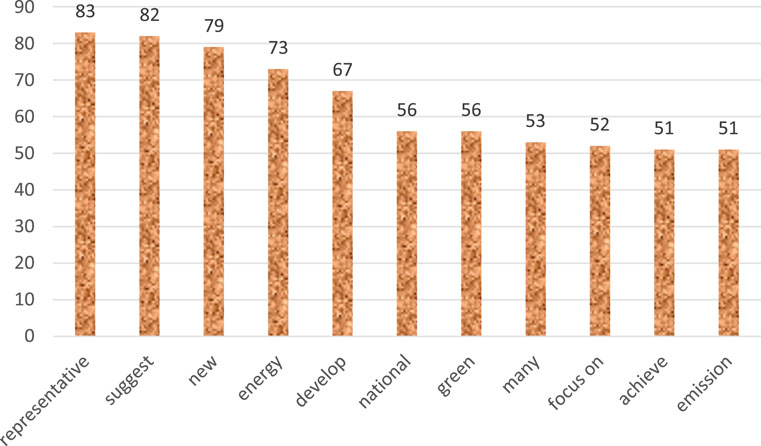
FIGURE 9. Most mentioned words for “carbon neutrality, two sessions and proposals” in Weibo microposts.
4.3 Sentiment Analysis
The research samples are also analyzed via AI Sentiment. The source data analysis is shown in Table 4. The most popular words (or tags) like ‘Achieve,’ ‘high quality,’ ‘improve,’ ‘support,’ and ‘good’ express a positive sentiment (Figure 10). From Figure 11, the words (or tags) with positive sentiment included ‘achieve,’ ‘high quality,’ ‘improve,’ ‘support,’ ‘good,’ ‘comprehensive,’ ‘relevant,’ and ‘cooperation.’ The negative sentiment include ‘pollution,’ ‘epidemic,’ ‘waste,’ ‘problems,’ ‘however,’ and ‘issue’ (Figure 12). From Figure 13, the proportion of positive sentiment accounts for 83.9%, while the negative sentiment only accounts for 9.9%. Figure 13 shows the distribution of positive, negative and neutral microposts percentage and Figure 14 illustrates the results of another algorithm that identified text emotions ranging from −18 to 40. The highest score (288) described Nanyang City’s economic activities and provided detailed guidance on achieving the goals while controlling pollution. The lowest one scored −18. It criticied extravagant moon cake packaging that caused a lot of waste and excessive emissions, detrimental to the carbon-neutral goal.
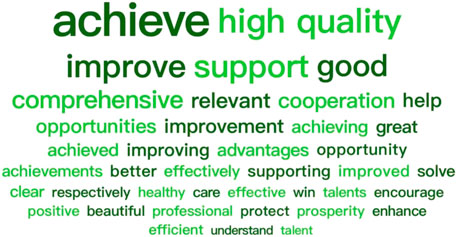
FIGURE 11. Word cloud for positive words in carbon neutrality microposts (Note: dark and light green are used to see all positive words or phrases in a clearer way).
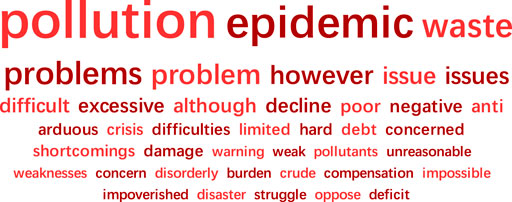
FIGURE 12. Negative sentiment (Note: dark red and light red are used in the chart to identify every negative word or phrase).
4.4 Parts of Speech
Figures 15 and 16 show the most frequent verbs and adjectives. Verbs such as “develop,” “contribute,” “promote,” and “continue” are related to goals and development and the future.
Regarding the adjectives of more than 1,000 times, all except “low” was positive. However, “low” was usually combined with words like “low carbon,” “low emission,” and collocations “New” were usually mentioned. Common collocations included “new energy,” “new chapter,” “new opportunity”. Although sustainable development is an old terminology, carbon-neutral is a “new concept”, and carbon-neutral policies are also new. Figure 15 shows the results of visualization.
4.5 Mega-Events and Carbon Neutrality
This study reflects carbon neutral events in China. As the first carbon neutral winter Olympics, “the Beijing Winter Olympics” appeared many times in Weibo. The Hangzhou Asian Games also appeared in the March microposts. These expressed user’s appreciation for the Beijing Winter Olympics and expectations for the Asian Games, the first Asian Games which achieve carbon neutrality.
4.6 Is Carbon Neutrality a Friend of Economic Development?
By examining the microposts, it was discovered that the Weibo users supported carbon neutrality and believed it would enable them to live better. Similar ideas like “sustainable development” and “green mountains and clear water are mountains of gold and silver” were popular in China before the Western world developed the concept of “carbon neutrality.” The idea of “carbon neutrality” is in line with Chinese policy, cultural norms, and ideals.
Beyond the bright side, several Weibo users questioned whether carbon neutrality was a trap set by the West to slow global development. We are all aware that industrial development must go through a process that results in substantial carbon emissions. Developing industries is essential for a developing nation. How can emerging nations conform to the industrial chain promise of carbon neutrality while assuring their development?
Many comments under this post advocated that the carbon neutrality commitments are all national aims. Nevertheless, the high carbon emissions in other countries frequently come at the expense of one country’s attempt to become carbon neutral. For instance, as low-end sectors shifted to Southeast Asia, local carbon emissions in China decreased but increased in Southeast Asian nations.
Another post mentioned that, ”carbon emission rights were an idea that the West utilied to stifle the development of later developing countries, according to another piece. China agreed to it because it represents the pinnacle of morality on the global stage.” This statement highlights the importance of governance to meet the social and environmental needs when we wish to realise the goal of carbon neutrality.
Other users have expressed criticisms and dialectical analyses of the microposts: “China’s carbon-neutral emission aim is not merely a moral dilemma in the highlands or a climate change problem. The most crucial aspect is that we employ it to improve our economic growth. As a result, the foundation for the sustainable development of the Chinese country was solidly constructed. Thus, the public favors low-carbon emission reduction, but they do not permit sacrificing national development and the quality of life for the people to reach the goal.
The promotion of high-quality development is vital for achieving carbon peak and neutrality, which must be done unwaveringly, according to the 2021 Central Economic Work Conference. It is nonetheless impossible to achieve all the goals at once. Since reaching the carbon peak and being carbon neutral would need significant economic and social transformation, it will not be simple. We must be steadfast for a long time if we want to promote carbon neutrality in an organized and methodical way. To solidly and successfully promote various works, we have to be patience.
5 Conclusion
One of China’s primary objectives is carbon neutrality; writers on Weibo indicated an interest in it. Through data collection and sentiment analysis on Weibo, this study made a novel contribution by demonstrating how different people’s concerns about carbon neutrality are related to the environment, social and governance (ESG). Weibo users expressed concern about new energy’s role in achieving carbon neutrality and commented on environmental issues, such as low carbon and sustainability. Their posts highlighted that new energy-related businesses in China worked hard to develop cutting-edge technologies.
The notion that achieving carbon neutrality will enable us to live better lives was widely held in the social aspect. People mentioned governance (responsibility and government reports) in their posts. Therefore, the ESG idea existed even though this word was seldom mentioned in microposts. Besides, Weibo users are optimistic that China will accomplish its carbon neutrality targets and support national policies, despite their concerns about the potential adverse impacts.
Data Availability Statement
The raw data supporting the conclusions of this article will be made available by the authors, without undue reservation.
Author Contributions
RL: Conceptualization, Validation, Writing-original and revised, Data analysis, Writing—review and editing, and Project administration, QW: Writing—original draft preparation, Investigation, Methodology, and Formal analysis LZ: Writing—original draft preparation, Software, Methodology, and Visualization HC: Resources and Conceptualization All authors have read and agreed to the submitted version of the manuscript.
Funding
We thanks to the support of the Ministry of Education of China (18YJA790065), the Anhui Provincial Social Science major project (AHSKZD2019D04), the Anhui Provincial Social Science (AHSKY2020D44), the Key Scientific Research Project of Anhui University of Finance and Economics (ACKYB20016), Anhui Provincial Teaching Quality Project (2020szsfkc0005, 2020zyrc023), Anhui University of Finance and Economics Outstanding Talent Training Innovation Project (aclzy2020009), Anhui Provincial Teaching Quality Project (2019jxtd056, 2020zyrc018, 2020szsfkc0004, acxnjys2021013), Teaching Quality Engineering of Anhui University of Finance and Economics (ackcsz2020015), and “Research on Effective Online Teaching of Public Foreign Language Courses for Postgraduates in the Context of Major Emergencies” (cxjhjyzdi2001).
Conflict of Interest
The authors declare that the research was conducted in the absence of any commercial or financial relationships that could be construed as a potential conflict of interest.
Publisher’s Note
All claims expressed in this article are solely those of the authors and do not necessarily represent those of their affiliated organizations, or those of the publisher, the editors, and the reviewers. Any product that may be evaluated in this article, or claim that may be made by its manufacturer, is not guaranteed or endorsed by the publisher.
References
Climate Watch (2022). Net-Zero Tracker. Available at: https://www.climatewatchdata.org/net-zero-. (Accessed April 11, 2022)
General Office of the Central Committee of the Communist Party of China (2015). Implementation Opinions on Strengthening the Construction of Consultative Democracy of the CPPCC. Available at: http://www.gov.cn/xinwen/2015-06/25/content_2884343.htm (Accessed April 11, 2022).
Gullberg, A. T., Ohlhorst, D., and Schreurs, M. (2014). Towards a Low Carbon Energy Future - Renewable Energy Cooperation between Germany and Norway. Renew. Energy 68, 216–222. doi:10.1016/j.renene.2014.02.001
Huang, W., Wu, F., Han, W., Li, Q., Han, Y., Wang, G., et al. (2022). Carbon Footprint of Cotton Production in China: Composition, Spatiotemporal Changes and Driving Factors. Sci. Total Environ. 821, 153407. doi:10.1016/j.scitotenv.2022.153407
Lee, C. B., Io, H. N., and Tang, H. (2022). Sentiments and Perceptions after a Privacy Breach Incident. Cogent Bus. Manag. 9, 1. doi:10.1080/23311975.2022.2050018
R. Y. M. Li, K. W. Chau, and D. C. W. Ho (Editors) (2022). Current State of Art in Artificial Intelligence and Ubiquitous Cities (Springer).
Liaoning Province Development and Reform Commission (2022). Liaoning Province Carbon Peak Carbon Neutral Work Leading Group Office Held a Video and Telephone Conference on the Quality Supervision of Carbon Emission Data of Key Emission Units in the Province. Available at: http://fgw.ln.gov.cn/xw/wndt/202204/t20220422_4545992.html (Accessed April 11, 2022).
Liaoning Province Development and Reform Commission (2021). Report of the Liaoning Provincial Development and Reform Commission on Correctly Viewing the Rising Coal Prices to Promote the Transformation and Upgrading of the Energy Structure. Available at: http://fgw.ln.gov.cn/xw/wndt/202107/t20210720_4220456.html (Accessed April 11, 2022).
Liu, J., and Lu, Y. (2022). Research on the Evaluation of China's Photovoltaic Policy Driving Ability under the Background of Carbon Neutrality. Energy 250, 123809. doi:10.1016/j.energy.2022.123809
National People’s Representative Meeting (1982). “Section 1, National People’s Congress, Chapter 3, State Institutions,” in Constitution of the People’s Republic of China. Beijing: Xinhuanet. Available at: http://www.npc.gov.cn/npc/c505/201803/e87e5cd7c1ce46ef866f4ec8e2d709ea.shtml.
Poria, S., Cambria, E., Bajpai, R., and Hussain, A. (2017). A Review of Affective Computing: From Unimodal Analysis to Multimodal Fusion. Inf. Fusion 37, 98–125. doi:10.1016/j.inffus.2017.02.003
Shi, L. (2006). Influencing Factors of Effective Implementation of Policies from the Perspective of System. J. Shanxi Youth Manag. Cadre Coll. 2006 (04), 33–35. Available at: https://kns.cnki.net/kcms/detail/detail.aspx?dbcode=&dbname=CJFD2006&filename=SQGL200604010&uniplatform=NZKPT&v=Wy55ZFb7z7wADXTOmSu5Hpui2CDOIX1qTh-QSenFoFplEWI7SHVB4aedspeigkSV.
Song, L., Li, R. Y. M., and Yao, Q. (2022). An Informal Institution Comparative Study of Occupational Safety Knowledge Sharing via French and English Tweets: Languaculture, Weak-Strong Ties and AI Sentiment Perspectives. Saf. Sci. 147, 105602. doi:10.1016/j.ssci.2021.105602
State Council of the PRC (2021a). Action Plan for Carbon Peaking before 2030. Beijing: The State Council of the People’s Republic of China. Available at: http://www.gov.cn/zhengce/content/2021-10/26/content_5644984.htm.
State Council of the PRC (2021c). China’s Policies and Actions on Climate Change. Beijing: The State Council of the People’s Republic of China. Available at: http://www.gov.cn/zhengce/2021-10/27/content_5646697.htm.
State Council of the PRC (2003). Notice of the State Council on Printing and Distributing China’s Action Plan for Sustainable Development in the Early 21st Century. Beijing: The State Council of the People’s Republic of China. Available at: http://www.gov.cn/zhengce/content/2008-03/28/content_2108.htm.
State Council of the PRC (2016). The State Council Issued a Notice on the Construction Plan of China’s Innovation Demonstration Zone for the Implementation of the 2030 Agenda for Sustainable Development. Beijing: The State Council of the People’s Republic of China. Available at: http://www.gov.cn/zhengce/content/2016-12/13/content_5147412.htm.
State Council of the PRC (2021b). The State Council’s Opinions on the Complete, Accurate and Comprehensive Implementation of the New Development Concept to Do a Good Job in Carbon Peak Carbon Neutrality. Beijing: The State Council of the People’s Republic of China. Available at: http://www.gov.cn/zhengce/2021-10/24/content_5644613.htm.
Sun, Z., Ma, Z., Ma, M., Cai, W., Xiang, X., Zhang, S., et al. (2022). Carbon Peak and Carbon Neutrality in the Building Sector: A Bibliometric Review. Buildings 12, 128. doi:10.3390/buildings12020128
The Intergovernmental Panel on Climate Change (2022). The Intergovernmental Panel on Climate Change Available at: https://www.ipcc.ch/.
Wei, Y. M., Chen, K., Kang, J.-N., Chen, W., Wang, X.-Y., and Zhang, X. (Forthcoming 2022). Policy and Management of Carbon Peaking and Carbon Neutrality: A Literature Review. Engineering. 1, 1. doi:10.1016/j.eng.2021.12.018
Weibo (2022). Weibo Reports Fourth Quarter and Fiscal Year 2021 Unaudited Financial Results. Beijing: Weibo Corporation. Available at: http://ir.weibo.com/node/8496/pdf.
Wyrwa, A., Suwała, W., Pluta, M., Raczyński, M., Zyśk, J., and Tokarski, S. (2022). A New Approach for Coupling the Short- and Long-Term Planning Models to Design a Pathway to Carbon Neutrality in a Coal-Based Power System. Energy 239. 122438. doi:10.1016/j.energy.2021.122438
Yang, C., Hao, Y., and Irfan, M. (2021). Energy Consumption Structural Adjustment and Carbon Neutrality in the Post-COVID-19 Era. Struct. Change Econ. Dyn. 59, 442–453. doi:10.1016/j.strueco.2021.06.017
Yao, Q., Li, R. Y. M., Song, L., and Crabbe, M. J. C. (2021). Construction Safety Knowledge Sharing on Twitter: A Social Network Analysis. Saf. Sci. 143, 105411. doi:10.1016/j.ssci.2021.105411
Zeng, L., and Li, R. Y. M. (2022). Construction Safety and Health Hazard Awareness in Web of Science and Weibo between 1991 and 2021. Saf. Sci. 152, 105790. doi:10.1016/j.ssci.2022.105790
Zhang, Y.-J., Liang, T., Jin, Y.-L., and Shen, B. (2020). The Impact of Carbon Trading on Economic Output and Carbon Emissions Reduction in China's Industrial Sectors. Appl. Energy 260, 114290. doi:10.1016/j.apenergy.2019.114290
Zhang, Z., and Lu, J. (2018). 2017 China Internet Development Research Report. Annual Report on The Development of The Internet and State Governance. ISBN: 978-7-5201-3728-7.
Zhao, Y. (2022). The Intrinsic Logic of Carbon Neutralisation in Carbon Reach Peak. Environment 03, 75–77. Available at: https://kns.cnki.net/kcms/detail/detail.aspx?FileName=HQYT202203036&DbName=CJFQTEMP.
Keywords: carbon neutrality, China, cluster analysis, Weibo, sentiment analysis, ESG
Citation: Li RYM, Wang Q, Zeng L and Chen H (2023) A Study on Public Perceptions of Carbon Neutrality in China: has the Idea of ESG Been Encompassed?. Front. Environ. Sci. 10:949959. doi: 10.3389/fenvs.2022.949959
Received: 22 May 2022; Accepted: 16 June 2022;
Published: 03 January 2023.
Edited by:
Xiao-Guang Yue, European University Cyprus, CyprusCopyright © 2023 Li, Wang, Zeng and Chen. This is an open-access article distributed under the terms of the Creative Commons Attribution License (CC BY). The use, distribution or reproduction in other forums is permitted, provided the original author(s) and the copyright owner(s) are credited and that the original publication in this journal is cited, in accordance with accepted academic practice. No use, distribution or reproduction is permitted which does not comply with these terms.
*Correspondence: Hong Chen, chenhong88_china@163.com
 Rita Yi Man Li
Rita Yi Man Li Qianqian Wang2
Qianqian Wang2  Liyun Zeng
Liyun Zeng